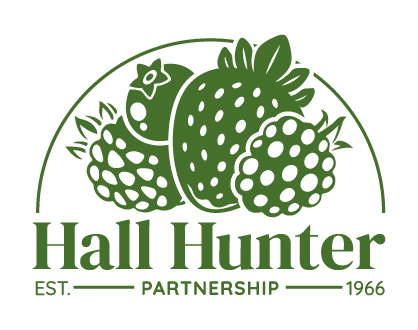

Hall Hunter Partnership (Farming)

Wokingham, United Kingdom
December 2024
Growing non-perennial crops
Agriculture/Growers
United Kingdom
Hall Hunter Partnership is one of the largest UK soft fruit growers in the UK, producing exceptional strawberries, raspberries, blueberries, and blackberries. Founded in 1966, HHP has grown into a dynamic, family-run business that blends tradition with cutting-edge innovation. With farms across the South of England, Hall Hunter delivers top-quality fruit while championing sustainable practices that protect the environment. HHP is passionate about sustainability, investing in solar energy, ground source heating systems, biodiversity projects and water-saving initiatives to lead the industry in eco-friendly farming. At its core, Hall Hunter is all about our people. The company empowers its team with an industry leading learning and development program, personal coaching, and internal promotion opportunities, while also engaging with local communities through school visits and charity partnerships. Every berry produced to Hall Hunter’s unwavering commitment to quality, innovation, and sustainability. As an Industry leader in British soft fruit farming, Hall Hunter continues to shape the future, delivering world-class fruit that delights customers and makes a positive impact on the planet.
Overall B Impact Score
Governance 14.7
Governance evaluates a company's overall mission, engagement around its social/environmental impact, ethics, and transparency. This section also evaluates the ability of a company to protect their mission and formally consider stakeholders in decision making through their corporate structure (e.g. benefit corporation) or corporate governing documents.
What is this? A company with an Impact Business Model is intentionally designed to create a specific positive outcome for one of its stakeholders - such as workers, community, environment, or customers.
Workers 18.1
Workers evaluates a company’s contributions to its employees’ financial security, health & safety, wellness, career development, and engagement & satisfaction. In addition, this section recognizes business models designed to benefit workers, such as companies that are at least 40% owned by non-executive employees and those that have workforce development programs to support individuals with barriers to employment.
Community 15.7
Community evaluates a company’s engagement with and impact on the communities in which it operates, hires from, and sources from. Topics include diversity, equity & inclusion, economic impact, civic engagement, charitable giving, and supply chain management. In addition, this section recognizes business models that are designed to address specific community-oriented problems, such as poverty alleviation through fair trade sourcing or distribution via microenterprises, producer cooperative models, locally focused economic development, and formal charitable giving commitments.
Environment 44.1
Environment evaluates a company’s overall environmental management practices as well as its impact on the air, climate, water, land, and biodiversity. This includes the direct impact of a company’s operations and, when applicable its supply chain and distribution channels. This section also recognizes companies with environmentally innovative production processes and those that sell products or services that have a positive environmental impact. Some examples might include products and services that create renewable energy, reduce consumption or waste, conserve land or wildlife, provide less toxic alternatives to the market, or educate people about environmental problems.
What is this? A company with an Impact Business Model is intentionally designed to create a specific positive outcome for one of its stakeholders - such as workers, community, environment, or customers.
Customers 3.4
Customers evaluates a company’s stewardship of its customers through the quality of its products and services, ethical marketing, data privacy and security, and feedback channels. In addition, this section recognizes products or services that are designed to address a particular social problem for or through its customers, such as health or educational products, arts & media products, serving underserved customers/clients, and services that improve the social impact of other businesses or organizations.